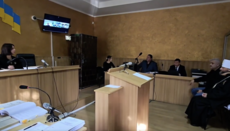Legal Department of UOC: Prohibitions to use land plots are illegal

The Legal Department of the UOC reminded that any illegal actions of officials against religious communities are untenable.
The Legal Department of the Ukrainian Orthodox Church published a statement on the illegal decisions of local governments to terminate the right to permanent use of land, the Information and Education Department of the UOC reports.
Currently, cases of illegal decisions by local self-government bodies to terminate the right of religious communities of the Ukrainian Orthodox Church to permanent use of land have become commonplace.
Religious organizations are deprived of the legal right to permanent use of land plots on which religious buildings and structures of the Ukrainian Orthodox Church are located.
The right to permanent use of a land plot is the right to own and use a land plot, which is in state or communal ownership, without a fixed term (Part 1 of Article 92 of the Land Code of Ukraine).
Religious organizations of Ukraine whose statutes (regulations) are registered in accordance with the procedure established by law, constantly use land plots that are in state or communal ownership, exclusively for the construction and maintenance of religious and other buildings necessary to ensure their activities.
A permanent land user – a religious organization may own a land plot indefinitely (manage it in accordance with its own interest), as well as use it (obtain its useful properties to meet its own needs), including by erecting religious buildings on it, their maintenance and intended use.
The right to permanent use of land is certified by a state act issued and registered in accordance with the procedure established by law (according to the content of part 1 of article 23 of the Land Code of Ukraine).
From the moment religious organizations receive State Acts for the right to permanent use of land, corresponding powers and legal obligations arise for the use of land plots by organizations. Such powers acquire a stable legal connection with religious organizations and become part of their property.
Termination of the right to permanent use of a land plot is carried out in cases provided for by law only in a judicial proceeding.
The grounds for termination of the right to use a land plot, according to Article 141 of the Land Code of Ukraine, are as follows:
1) voluntary renunciation of the right to use a land plot;
2) withdrawal of a land plot in the cases provided for by this Code;
3) termination of the activities of religious organizations, state or communal enterprises, institutions and organizations;
4) use of the land plot in ways that are contrary to environmental requirements;
5) use of the land plot not for the intended purpose;
6) systematic non-payment of land tax or rent;
7) acquisition by another person of the right of ownership to a residential house, building or structure located on a land plot;
8) use of a land plot in a manner that is contrary to the requirements for the protection of cultural heritage.
The law also provides for the compulsory termination of the right to use a land plot.
According to Article 143 of the Land Code of Ukraine, the forced termination of rights to a land plot is carried out in a judicial proceeding in the following cases:
1) use of the land plot not for the intended purpose;
2) non-elimination of violations of the law (contamination of land with radioactive and chemical substances, waste, sewage, contamination of land with bacterial-parasitic and quarantine pests, contamination of land with prohibited plants, damage and destruction of the fertile soil layer, engineering infrastructure facilities, violation of the established mode of use of specially protected lands, as well as the use of lands in ways that cause harm to public health) within the time limits established by the instructions of the bodies exercising state control over the use and protection of lands;
3) confiscation of a land plot;
4) compulsory alienation of a land plot based on public necessity;
5) forcible foreclosure on a land plot under under obligations of the owner of this land plot;
5-1) forcible foreclosure on the right of emphyteusis, superficies under the obligations of the person using the land plot in such right.
The procedure for terminating the right to use land plots is provided for by Chapter 22 of the Land Code of Ukraine. According to Article 144 of the Land Code of Ukraine.
The specified article determines that in the event of a violation of land legislation, the state inspector for control over the use and protection of land or the state inspector for environmental protection draws up a protocol on an administrative offense, imposes an administrative penalty on the person who committed the offense and issues an order to this person on its elimination within 30 days.
If the person who violated the land legislation did not comply within the specified period with the order of the state inspector to stop the offense, the state inspector for control over the use and protection of land or the state inspector for environmental protection imposes an administrative penalty on such person in accordance with the law and re-issues an order to stop the offense and eliminate its consequences within 30 days.
In the event that the consequences of a violation of land legislation are not eliminated within 30 days, the body of state control over the use and protection of land or the body of state control over the protection of the natural environment applies to the court with a claim to terminate the lease agreement, emphyteusis, superficiality of the land plot or the agreement on the establishment of a land easement, termination of the right to permanent use of the land plot.
Therefore, according to the content of the norms of the Land Code of Ukraine, the right to decide on the termination of the right to permanent use of a land plot is exercised by state authorities and local governments only in the event of a voluntary refusal of the land user from permanent use of the land plot.
In all other cases provided for by law, the termination of the right to permanent use of a land plot is possible only after a court decision, which must enter into force.
Local self-government bodies are vested only with the rights granted by law to the plaintiff, including filing a lawsuit in court, supporting claims in court, providing evidence in support of the stated claims to terminate the right of a religious organization to permanent use of a land plot, and to carry out other actions within their purview in the manner and terms established by law.
When deciding to terminate the right of a religious organization to permanent use of a land plot arbitrarily without the consent of a religious organization, executive authorities or local governments exceed their powers and grossly violate the rights of a land user to the right to permanent use of a land plot.
Regarding the religious buildings and structures erected on the land plot, we additionally pay special attention to the Resolution of the Grand Chamber of the Supreme Court dated February 16, 2021 in case No. 910/2861/18, according to which the subject of the right to permanent use of a land plot acquires the right of ownership to real estate objects built on such a land plot.
Therefore, based on the principle of the unity of the legal fate of the land plot and the building or structure located on it, the right of ownership is acquired by the one who has a property right to the land.
The Grand Chamber of the Supreme Court once again reminds that in case of illegal appropriation of the property of the owner by another person, a vindication claim (Article 387 of the Civil Code of Ukraine) should be an appropriate way of protection. The purpose of the vindication action is to ensure the introduction of the owner into possession of the property, which he/she was unlawfully deprived of.
We note that any illegal actions of officials against religious communities are unacceptable on the way of our state to European principles and European integration, notably during martial law.
The Constitution of Ukraine (Article 19) obliges state authorities and local self-government bodies, their officials to act only on the basis, within the limits of authority and in the manner provided for by the Constitution and laws of Ukraine.
The Legal Department of the Ukrainian Orthodox Church called on all state authorities and their officials involved in the implementation of the Law not to create obstacles in the activities of religious organizations of the Ukrainian Orthodox Church, but to act in strict accordance with the requirements of the Law and other acts of the current Ukrainian legislation, bearing in mind the requirements of rationality, justice and tolerance.
Earlier, the UOJ wrote that the Kamyanets-Podilskyi City Council took 20 plots under the temples from the UOC.
On April 4, the Khmelnytsky City Council deprived the UOC of the rights to the land plots on which churches were built, the John the Baptist Monastery and the diocesan administration.





